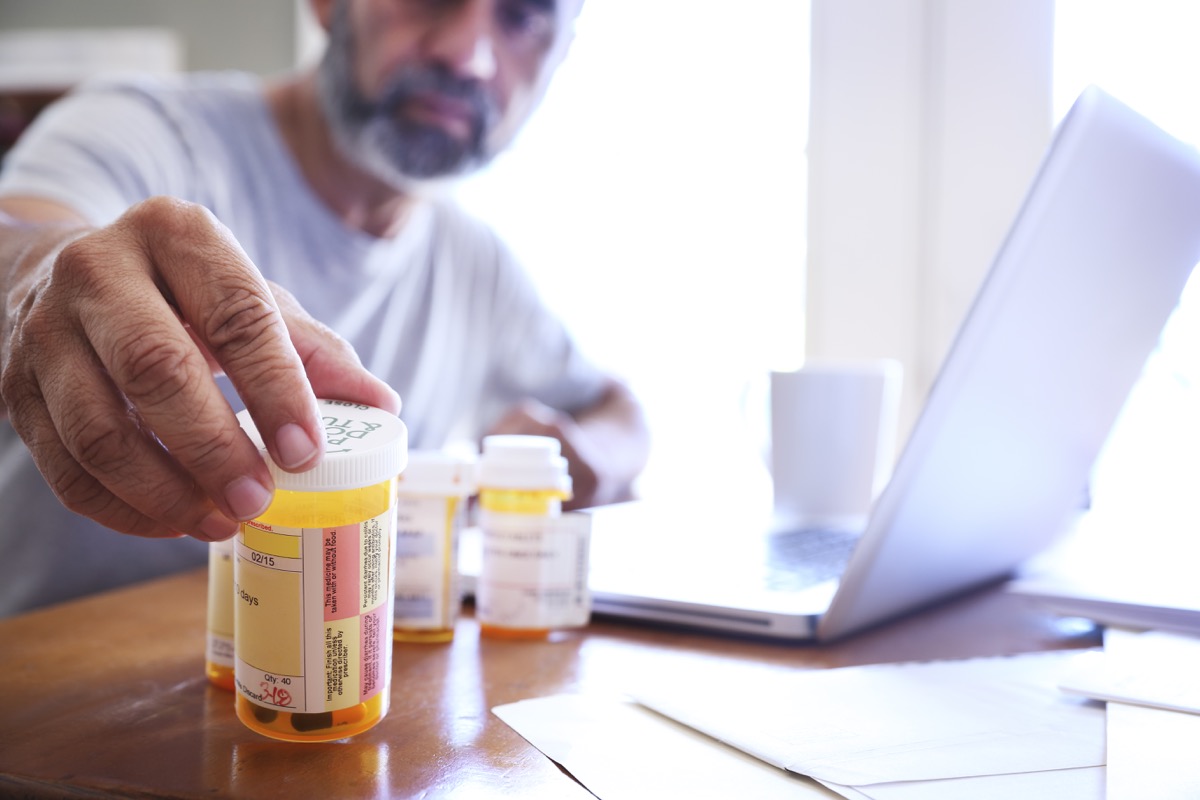5 Reasons You Shouldn’t Ask Your Doctor to Prescribe Meds You See on TV

When flipping through TV channels, it’s common to see direct-to-consumer ads promising pharmaceutical relief from whatever ails you. However, some experts warn that it’s best to exercise caution before asking your doctor to prescribe meds you’ve seen on TV.
“While yes, it is OK to ask your doctor for a specific medication, it’s better to tell your doctor what you’re experiencing and allow them to ask follow-up questions,” board-certified family physician Laura Purdy, MD, tells Best Life. “Then your doctor can decide what’s good for you. Commercials can’t really tell the whole story.”
Though of course advertising doesn’t inherently make a drug unsuitable for use, asking your doctor for an advertised drug could do more harm than good, for several reasons. Read on to learn why you may want to hold off on asking your doctor to prescribe a medication you’ve seen on a TV ad.
READ THIS NEXT: If You Take This Medication, You’re More Likely to Get a Blood Clot.
1
Few of them are considered top-tier therapies, a new study says.

The pharmaceutical industry spent 6.88 billion dollars on direct-to-consumer pharmaceutical advertising in 2021, according to the market and consumer data site Statista. However, experts warn that the bulk of their budgets are not necessarily spent on drugs that are the highest performing.
In fact, a Jan. 2023 study published in the journal JAMA Network Open found that just 27 percent of medications commonly advertised in the U.S. are considered highly rated first-line therapies. Meanwhile, during the six-year study period, pharmaceutical companies spent 16 billion dollars to advertise drugs which were categorized as “low benefit” based on regulatory reviews from three different health agencies, the study authors wrote.
“Proponents of direct-to-consumer pharmaceutical advertising often argue that these ads have high public health value by encouraging uptake of the most therapeutically beneficial therapies,” Neeraj Patel, the study’s lead researcher and a medical student at the Yale School of Medicine, recently told U.S. News & World Report. “Our study pushes back against this argument.”
READ THIS NEXT: 4 Meds That Are Raising Your Blood Pressure, Experts Say.
2
You may unduly influence your doctor’s opinion.

Research shows that by mentioning or requesting meds you’ve seen on TV, patients often influence their doctor’s decision to prescribe. A 2014 study published in the journal Medical Care analyzed doctor-patient interactions regarding two particular drugs: oxycodone as a treatment for sciatica and Celebrex for knee osteoarthritis. They found that “19.8 percent of sciatica patients requesting oxycodone would receive a prescription for oxycodone, compared with one percent of those making no specific request. Fifty-three percent of knee osteoarthritis patients requesting Celebrex would receive it, compared with 24 percent of patients making no request.”
The study authors argued that this could influence doctors in ways that do not benefit their patients. “Decisions about whether to prescribe a medication, and which medication to prescribe, were traditionally made by physicians, with patients assuming a more passive role,” they explained, adding that this is no longer considered standard. “Patients are [now] more likely to come to a clinical encounter with a desired therapeutic plan already in mind, such as a prescription for a specific agent,” they wrote. “Despite misgivings, many physicians accede to a patient’s medication request.”
3
Drug ads can be “misleading,” some experts say.

Swaying your doctor’s willingness to prescribe a particular drug can be especially problematic since drug ads are poorly regulated, Patel warns. “The FDA does not review and approve all advertisements before they air, and often has to play ‘catch-up’ and regulate advertisements after they are already public,” he told U.S. News. Patel added that “this type of advertising can be misleading, lead to inappropriate prescribing, and inflate health care costs.”
For more health news sent directly to your inbox, sign up for our daily newsletter.
4
Advertised drugs are usually more expensive than generics.

By asking for meds you’ve seen on TV by name, you may also be wasting your hard-earned money. That’s because when you do so, you’re more likely to receive the brand name drug you’ve mentioned rather than a generic drug that is equally effective and far lower in cost.
According to the FDA, generic drugs are bioequivalent to their name-brand counterparts. This means they’re “created to be the same as an already marketed brand-name drug in dosage form, safety, strength, route of administration, quality, performance characteristics, and intended use.” They stress that “a generic medicine works in the same way and provides the same clinical benefit as the brand-name medicine.”
5
You may be less likely to follow your treatment plan.

When you ask your doctor to prescribe meds you’ve seen on TV, you may actually be less likely to follow the treatment plan, warned Abby Alpert, PhD, a health care management professor at the Wharton School at the University of Pennsylvania. “While advertising increases drug adherence among existing patients, we also find that among people who initiate treatment because of advertising, their compliance with treatment is actually lower on average, she told the business journal Knowledge at Wharton.
This is cause for concern, especially if it reflects that “advertising is capturing people for whom treatment is marginally less appropriate or for people who are simply less attached to treatment,” said Alpert. “Initiating a treatment without complying with it will lead to increased drug spending without very many gains to health.”
Best Life offers the most up-to-date information from top experts, new research, and health agencies, but our content is not meant to be a substitute for professional guidance. When it comes to the medication you’re taking or any other health questions you have, always consult your healthcare provider directly.